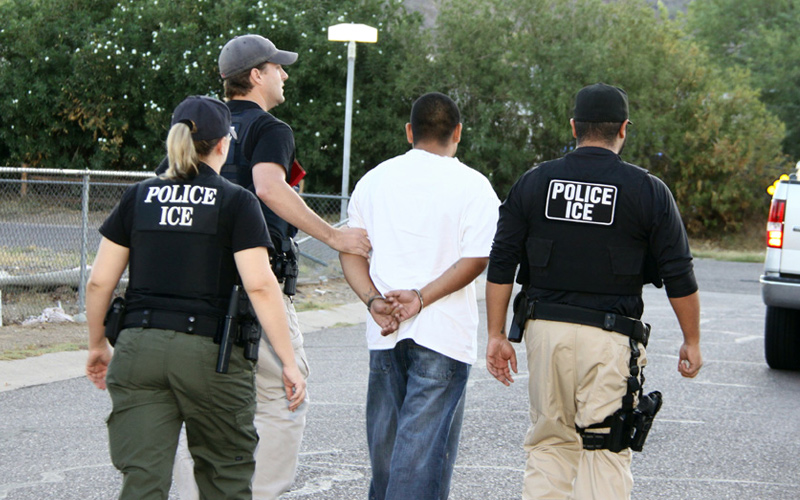FOR IMMEDIATE RELEASE
January 8, 2012, Washinton, D.C. - U.S. Citizenship and Immigration Services (USCIS) posted a Notice of Intent in the Federal Register outlining a proposed change to its current process for the filing and adjudication of waivers of inadmissibility relating to unlawful presence.
The proposed process would allow certain individuals seeking permanent residence through their U.S. citizen immediate relatives to apply for waivers of inadmissibility before leaving the U.S. for their interview at a U.S. Embassy or Consulate overseas.
These are the official Questions and Answers regarding the proposal.
Q. Why is USCIS proposing the change?
A. This proposed change will reduce the time that U.S. citizens are separated from their spouses and children under certain circumstances while those family members are going through the process of obtaining visas to become legal immigrants to the United States. Under current policy, individuals who wish to apply for a waiver of inadmissibility for unlawful presence must leave the U.S. and apply for a waiver at a U.S. consular office outside the United States. This process can be lengthy and discourages individuals who may be eligible for this waiver from applying, which delays their ability to lawfully reenter the U.S. The proposed change would reduce the amount of time that U.S. citizens would be separated from their spouses and children while the process to obtain a visa to immigrate takes place. This reflects the Administration’s strong commitment to efficiency in the administration of immigration law and facilitation of legal immigration.
Q. How is the proposed process different from the current process?
A.Currently, U.S. citizens who petition for their spouses and children to become legal immigrants to the United States must petition for a visa, and in some circumstances, if the spouse or child has accrued more than 180 days of unlawful presence in the U.S., that spouse or child must also petition for a waiver of a ground of inadmissibility in order to have his or her visa application processed. The proposed process does not change the requirements for obtaining a visa or the standards for obtaining a waiver. Nor does it change the requirement that the spouse or child of a U.S. citizen ultimately depart the United States to have his or her visa application processed at a consulate abroad. The only change contemplated by this proposal is that the spouse or child would be able to apply for a waiver with USCIS in the U.S. and receive a provisional decision on that waiver before departing the U.S. for consular processing of their immigrant visa applications. Currently, applicants can only file for a waiver after having been determined inadmissible by the U.S. consular officer and must wait abroad for a decision, which significantly adds to the processing time for their case. The proposal limits the extent to which the process forces the lengthy separation of families.
Q. When will this streamlined process be implemented?
A. The process will be implemented only after USCIS issues a final rule. In the coming months, USCIS plans to publish a notice of proposed rulemaking and will consider the comments received as part of that process before publishing a final rule. The current process will remain in place until a final rule goes into effect. No one should file an application with USCIS based on this proposed change in process. Any applications filed with USCIS based on this notice will be rejected and the application package returned to the applicant, including any fees until the final rule is issued and the change becomes effective.
Q. Who would be eligible for a provisional waiver?
A.Spouses and children of a U.S. citizen (1) who are seeking lawful permanent residence through an immigrant visa, (2) who are found inadmissible based on unlawful presence in the United States for more than 180 days, and (3) who meet the existing extreme hardship standard. Children under the age of 18 do not accrue unlawful presence and, as a result, are not required to obtain a waiver.
Q. Why is this proposed streamlined process limited to the spouses and children of U.S. citizens?
A.The policy objective of this proposed process change is to alleviate extreme hardship suffered by U.S. citizens. USCIS has thus identified immediate relatives of U.S. citizens as the class of aliens to consider for this procedural change. In addition, their immigrant visas, which are not subject to annual limitations, are always immediately available. The focus on U.S. citizens and their immediate relatives is consistent with Congress’ prioritization in the immigration laws of family unification. This proposal meets the goals of both improving efficiency and reducing the length of time that American families are unnecessarily separated.
Q. How would the proposed process affect existing standards related to unlawful presence and the extreme hardship standard?
A.It would not. The proposed process retains all of the legal standards and policies related to unlawful presence determinations and establishing extreme hardship. It would simply provide for the processing of these waivers in the United States instead of abroad.
Q. Will individuals who recieve the waiver be able to adjust their status without leaving the United States?
A. No. The visa process itself is not changing. Individuals who receive a provisional wavier would still be required to depart the United States to apply for their immigrant visa.
Q. Is everyone who has accrued more than 180 days of unlawful presence subject to a three- or 10-year bar from entering the U.S.?
A.Yes; however, some aliens do not accrue unlawful presence if they fall into certain categories. For example, children under the age of 18 do not accrue unlawful presence for any period of time before their 18th birthday. Similarly, under current law, certain victims of crime and aliens with pending asylum applications do not accrue unlawful presence while their application is pending.
Q. If an individual already filed a Form I-601 from outside the U.S., would the proposed process affect him or her?
A.No. It would only affect individuals who have not yet filed a Form I-601 and who will file a waiver request after a final rule is published.
Q. Would USCIS collect biometrics as part of the streamlined process?
A.Yes. It is contemplated that applicants in the United States would be scheduled for biometrics collection at a USCIS Application Support Center.
Q. Why does USCIS refer to the waiver as “provisional?”
A.In the proposed process, USCIS would grant the provisional waiver before the applicant departs the U.S. for consular processing of their immigrant visa applications. The provisional waiver, however, would not take effect until the individual departs from the United States and triggers the covered ground of inadmissibility. Moreover, the provisional waiver covers only the unlawful presence grounds of inadmissibility. If the consular officer finds during the immigrant visa interview that the individual is subject to another ground of inadmissibility, the individual would need to file another waiver application with USCIS.
Q. What would happen at the consular interview?
A.If DOS found the individual otherwise eligible for the immigrant visa, the consular officer would then issue the visa, allowing the individual to immigrate to the U.S.
Q. What would happen to individuals who are not eligible to file a waiver under the proposed process?
A.They would continue to follow current agency processes for filing waiver requests after a determination of inadmissibility is made by a U.S. consular officer overseas.
Q. What would happen to individuals who are denied waivers under the proposed process?
A.They would be subject to USCIS guidance and law enforcement priorities for issuing Notices to Appear (NTA). For example, convicted criminals, public safety threats, and those suspected of fraud will receive NTAs.
Source: http://www.uscis.gov/portal/site/uscis/menuitem.5af9bb95919f35e66f614176543f6d1a/?vgnextoid=95356a0d87aa4310VgnVCM100000082ca60aRCRD&vgnextchannel=8a2f6d26d17df110VgnVCM1000004718190aRCRD
`












